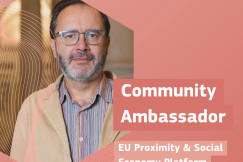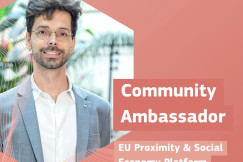Best practices
30 April 2025
Co-Designing Engaged Research Capacities in the Social Economy
Best practices
30 April 2025
Skills
Proximity and social economy
Access to technology
+13 more
Login / create an account to be able to react
-
16

The RISE project brought together around 100 Social Economy Organisations (SEOs), researchers and other key stakeholders across Europe in a series of workshops to identify the main reasons preventing greater involvement in Engaged Research practices. These workshops highlighted systemic barriers and the most silent challenges that SEOs face and paved the way for the development of a tailored training programme enabling SEOs to become “research-ready”.
Topics
Albania
Armenia
Austria
Belgium
Bosnia and Herzegovina
Bulgaria
Croatia
Cyprus
Czechia
Denmark
Estonia
EU-27
Finland
France
Georgia
Germany
Greece
Hungary
Iceland
Ireland
Italy
Kosovo
Latvia
Liechtenstein
Lithuania
Luxembourg
Malta
Moldova
Montenegro
Netherlands
North Macedonia
Norway
Poland
Portugal
Romania
Serbia
Slovakia
Slovenia
Spain
Sweden
Switzerland
Türkiye
Ukraine
Academic / Research and VET Institutions
Business Support Organisation
Networks and Federations / Confederations
NGOs / Non-profits
SMEs (a company with less than 250 employees)
Social Economy Entity
-
Thematic area
-
-
Skills
-
-
Interlinkages with other sectors
-
-
Proximity and social economy
-
-
Action areas and keywords
-
-
Access to technology
-
Addressing capacity and skills gap
-
Boosting digital skills by - and in the social economy
-
Education
-
Future workplaces
-
Innovation
-
Innovation as enabler for green transition and business development in the social economy
-
Local Green Deals, green business communities and citizens’ initiatives
-
Supporting Digital Social Innovation & Tech for Good entrepreneurship
-
-
Ecosystem focus
-
-
Proximity economy
-
Social economy
-
-
Scope of activity
-
-
Local/neighbourhood
-
National
-
Regional
-
Share
RISE (Engaged Research in the Social Economy) is a new Erasmus+ project that aims to build the skills of social economy organisations to partner in projects with research institutes. The objective is to encourage more Engaged Research projects, a practice that creates socially impactful initiatives through active collaboration between researchers and communities. The project is led by a consortium of four partners, including The Wheel (project coordinators, Ireland), Diesis Network (Belgium), European Citizen Science Association ECSA (Germany), and Science for Change (Spain).
Thanks to their proximity to local and affected communities, social economy organisations are key to conducting socially impactful research, helping academics get more direct access to target groups and collect necessary data in a safe and ethical manner. However, most research projects conducted by SEOs currently do not qualify as engaged research. One reason for this is a major skills gap. RISE aims to address this gap by developing a tailored learning programme that will help SEOs become “research-ready”, build meaningful partnerships with research institutes, and design evidence-based service delivery and public policy work.
Engaged Research is the future in research and social economy alike. Funders are no longer satisfied with the tokenistic involvement of target groups, requiring active engagement of end-users from project design to the mainstreaming of results. Moreover, services and advocacy delivered for and on behalf of communities are expected to be informed by quality and up-to-date research. A better collaboration between SEOs and researchers is thus vital for addressing some of the most urgent societal challenges that we are currently facing, including the green and digital transition, changing demographics, inequality, social injustice and more. However, in order to achieve this goal, it is necessary to:
- create a quality skills intervention for SEOs to ensure that they have the skills and confidence to participate as equal players in Engaged Research, and
- raise the overall visibility of Engaged Research in the EU, so that more people understand its benefits and are willing to participate and invest in it.
Gaps and Barriers Workshops
In order to achieve its mission of empowering Social Economy Organisations to co-create knowledge and drive social change, throughout the month of February 2025 the RISE project hosted 19 collaborative workshops across the consortium to identify the most pressing gaps and barriers preventing SEOs from actively participating in research projects. These sessions brought together around 100 SEOs, researchers and other key stakeholders, providing an open platform to reflect, share, and discuss ways for a more meaningful collaboration in Engaged Research practices.
The most important findings showed that SEOs are often excluded from research processes due to persistent barriers, be it the lack of funding tools, weak ties to academia, limited internal capacities, or challenges connected with effective data management and tailored communication strategies. Moreover, many participants viewed research as detached from their advocacy or social economy mission, with little space or support to engage with it in a meaningful and sustainable way. What is more, the identified gaps and barriers were not only technical but also cultural. Misaligned goals with research institutions, the inaccessibility of academic language and research methods, and ethical concerns around extractive practices also emerged as key issues.
Overall, the workshops revealed a shared need across the consortium: the development of stronger, more equitable research partnerships between SEOs and academia and the importance of mutual respect, co-design, and sustained collaboration if Engaged Research initiatives are to be truly impactful.
Looking Ahead
In order to overcome the identified gaps and barriers, RISE is currently developing a practical capacity-building training programme in order to make SEOs “research-ready”. The training aims to equip SEOs with the tools and knowledge necessary to design, manage, and evaluate Engaged Research projects and thus collaborate with researchers as equal partners. By embedding Engaged Research skills into their strategies, SEOs can shape evidence that matters – to their communities and policymakers alike.
This co-created training programme will be piloted and refined through two piloting rounds in autumn 2025 and spring 2026, with the aim to train 120 SEOs across the consortium.
If you were interested in participating in the pilot trainings, you can sign up here. For more information about the project, visit https://www.engaged-rise.eu/ or the project LinkedIn page.
Comments (0)
See also
-
18
Abacus: Education and Culture as Drivers of Social Change
- Categories
- Partnerships Regenerative Green Transition Skills +30 more
-
97
PSE Platform Ambassador highlight: Flaviano Zandonai and National Consortium CGM
- Categories
- Partnerships Regenerative Green Transition Skills +68 more
-
11
PSE Platform Ambassador highlight: Jaume Puigpinós Serra, Taula del Tercer Sector
- Categories
- Partnerships Regenerative Green Transition Skills +68 more




